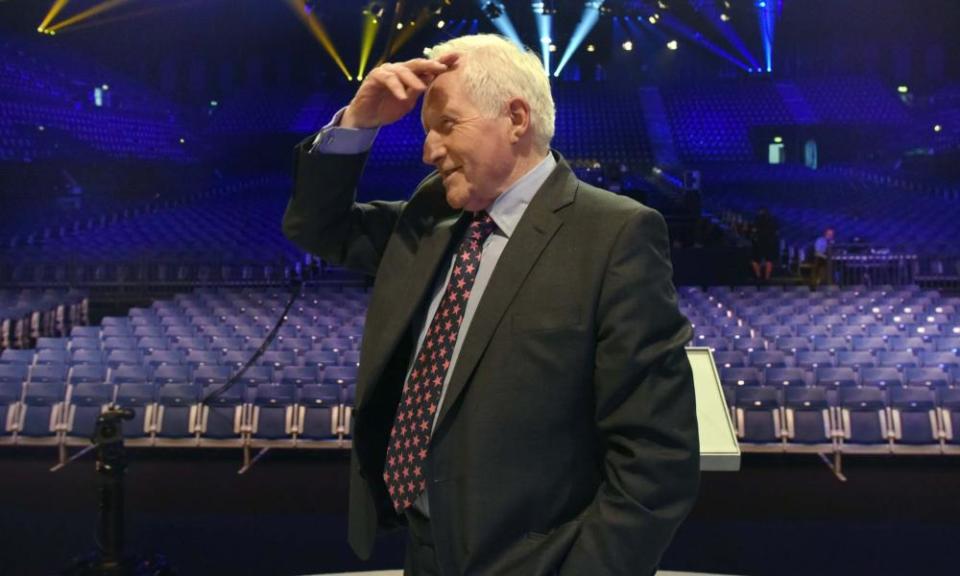Who should replace the irreplaceable David Dimbleby? Arise, Mary Berry

With a calm authority in his timbre and a cheeky twinkle in his eye, David Dimbleby – the nation’s Dumbledore - has expertly guided the show through its golden age, harnessing all the rage and energy of modern Britain into an improbably palatable hour of weekly TV.
How can it possibly go on without him? The runners and riders are already in place: Kirsty Wark is the bookies’ favourite, Emily Maitlis is not far behind, and Samira Ahmed has boldly applied for the role via Twitter. There are surprisingly few male names being mentioned, with Maria Miller MP – the chair of the parliamentary women and equalities select committee – leading calls for the BBC to appoint a woman to the role for the first time.
At least the format itself is cast-iron strong. While other TV shows have to evolve to keep up with society, Question Time has stood still and waited for society to catch up with it. Remember, when it started in 1979, there wasn’t quite such a surfeit of livid opinion among the British public as there is today. These were the days when politics, like religion, was still regarded as an out-of-bounds topic for everyday conversation.
I once saw a prominent frontbencher almost reduced to tears as a party spin doctor aggressively coached them for a QT appearance
Nowadays, every last idiot you pass on the street has an enormous and inflexible position on everything. Question Time is a weekly snapshot of where the debate currently stands, neatly encapsulating the wild cacophony of opinion that has raged all week on Twitter and beyond.
For most frontbench politicians, an invite to appear on Question Time represents an unwelcome chore. They are put in a position where they have nothing to gain and everything to lose: they must attempt to simultaneously toe the party line, deflect attacks from their fellow panellists and satisfy their interrogators in the audience. To do any one of those things in isolation is almost impossible. To attempt all three at once is futile. But someone has to do it and if you say no too many times then your party whip or the leadership office will mark you down as a shirking bottle-job with no stomach for frontline battle.

If you’re just a humble journalist or gobshite for hire, you’re there mostly because it’s nice to be asked and so you can’t go far wrong as long as you don’t try and look clever. I have friends who have spent more time studying for a single hour on Question Time than they ever did for their GCSEs and A-levels combined. Mind you, I also once sat in a room and witnessed a prominent frontbencher almost reduced to tears as a party spin doctor aggressively coached them for a Question Time appearance in much the same style as Louis Gossett Jr trained Richard Gere in An Officer and a Gentleman.
But it is audience members who have provided the stand-out moments of recent years: from the Great Wall Of Gammon (the term coined on Twitter by Ben Davis in 2017 to describe a collage of angry, white, middle-aged audience members) to mum of four Michelle Dorrell, who tearfully attacked Amber Rudd over the government’s cutting of tax credits in 2015. Like a reality show for politicos, Question Time now has the capacity to turn civilians into semi-celebrities overnight. There was the “I want my country back” woman of 2016, and the man who memorably asked the panel if they “watched the internet?” in a debate about refugees.
Dimbleby is the benevolent ringmaster who lends charm and humanity to what would otherwise be a grotesque spectacle of conflict no more edifying than watching a gang of Staffies fighting in a pub car park. One simple chuckle or exasperated aside from Double D is enough to diffuse even the most furious of disputes, and remind us that this all supposed to be a bit of Thursday night fun.
For that reason, the BBC would be foolish to go back down the Robin Day route and replace Dimbleby with a clever-clogs or a sour puss like Nick Robinson or Jeremy Paxman. What Brexit Britain needs now more than ever is someone – male or female – who can give us all a bit of a cuddle with their twinkly eyes and tell us that, however mad we all get with each other, everything will probably be alright in the end. Mary Berry gets my vote.
• Sam Delaney is a writer and broadcaster and author of Man Men and Bad Men: What Happened When British Politics Met Advertising

 Yahoo News
Yahoo News 
